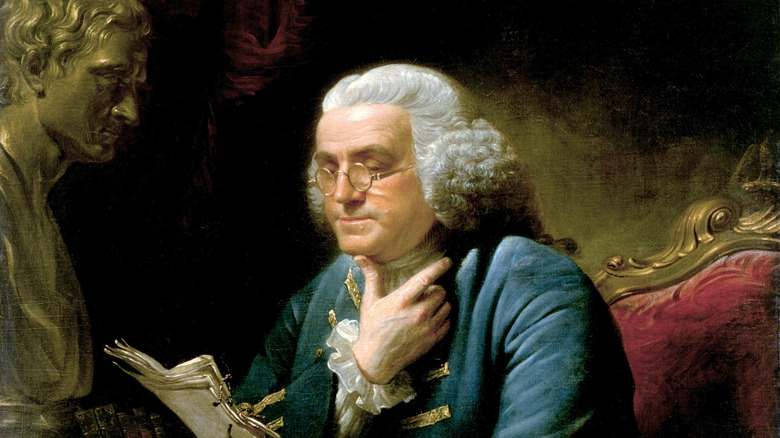Benjamin Franklin's 1781 Essay About Farting Explained
Farting. If that word alone made you grin or chuckle, then you pass the universal human humor test. Whether spluttering, squeaking, hissing, silent, or some combination of the above, farting has got to be one of the most inherently funny things a person can do. Some digestive gases seep or squeeze out of your butt, make a funny sound, and you laugh at your loved one's horrified face. Or, you're sitting on public transportation in a packed bus, suck down the reek, scowl and scan the faces of everyone around you searching for evidence of guilt. It's the little joys, folks.
And don't think for a second that people have ever been any different. Do you think your favorite, glamorous pop star doesn't root and toot around the house? Hah. How about grand, sententious historical figures that folks associate with marble statues and textbooks more than real, physical existences? Yeah, they were burping, vomiting, pooping, and farting along with the rest of us. Julius Caesar? Farted. Leonardo Da Vinci? Farted. Isaac Newton? Farted. Benjamin Franklin? Farted and penned an essay about it.
Some people take 1781's Letter from Benjamin Franklin to a Royal Academy About Farting as some serious sociopolitical or scientific treatise, but ... really? Franklin's sense of humor was legendary. In his essay, Franklin pontificates about the scents of farts mingling with the air, farts ruining human happiness, and even speculates about some medicinal way to transform the smell of farts into something "agreeable as perfumes."
Scarcely worth a fart-hing
Benjamin Franklin was living in Paris at the time he wrote his fart essay, and as Vox explains, was a bit annoyed by the uselessness of much of the scientific inquiry of his day. And so, he sat down and wrote a very short, 1000-word essay exhorting the powers that be at the Royal Academy of Brussels to get down to this whole business of ridding humanity of the stank of farts.
Franklin starts off his essay with a gushing, ingratiating opener where you can practically hear him suppressing a characteristic smirk while bowing. Then he pivots to the flatulent business at hand, writing, "It is universally well known, that in digesting our common Food, there is created or produced in the Bowels of human Creatures, a great Quantity of Wind." He talks about farty air mixing with the atmosphere, producing a "fetid Smell," and how "well-bred People" "forcibly restrain the Efforts of Nature to discharge that Wind." We'll just say right now that referring to farting as a "discharge" of wind is excellent.
Franklin goes on to mention the competing vices of runny noses and spitting, and suggests that researchers "discover some Drug wholesome & not disagreeable, to be mix'd with our common Food, or Sauces" to nullify bad fart smells. Then, he calls upon the names of philosophical titans like Aristotle and Descartes, rattles off some metaphysical gobbledygook, and ends by concluding that the "Science of the Philosophers" is "scarcely worth a" — he skips a line — "FART-HING."
A comedic maestro
While Benjamin Franklin's farty essay stands out for its topic, it's just one of a litany of comedic works, quotes, quips, phrases, letters, and such, that Franklin wrote. Highlights include a conversation between Franklin and gout, advice to a friend about choosing a mistress, "Rules for Making Oneself a Disagreeable Companion," and parts of his own autobiography. That doesn't mean it was all fun and games with Franklin, only that he recognized how crucial wry humor and absurdity were to life. If only Franklin could have had a single conversation with Mark Twain.
But because it's Franklin writing the work in question, his essay to the Royal Academy of Brussels still gets tackled in an academic, serious way that more reflects our own inability to take a joke — remember what we said about historical figures associated with marble statues or textbooks? Suffolk University approaches the essay in a rather stiff-collared way and begrudgingly admits that it's likely a gag. History Oasis, meanwhile, goes for the literary angle when discussing Franklin's suggestion about using farts as an energy source, describing it as, "a notion that, while undoubtedly amusing, also speaks to the boundless potential of human ingenuity." Okay. Or, farting is just funny and Franklin found it extra amusing to imagine that those reading his essay wouldn't understand that he was having fun, either. So lighten up, eat some beans, and enjoy imagining a future full of energy-generating hoses strapped to everyone's flubbing butts.


